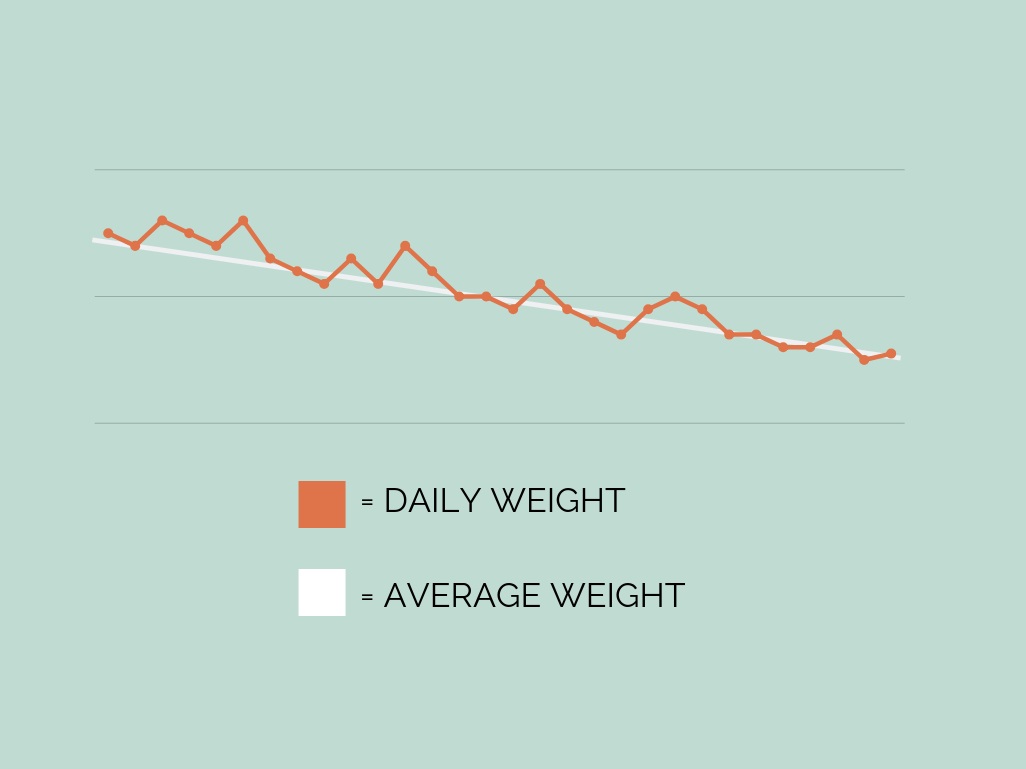Evaluating the Role of the Scale in Your Fat Loss Journey
How to Measure Fat Loss Over Weight Loss
While we all technically know that our weight is just an arbitrary number on a device, it can be difficult let go of the anxiety and frustration that number sometimes carries. It’s easy to step on the scale and either feel proud when we see the number has decreased, or hopeless when it hasn’t because it feels like our hard work isn’t paying off.
This fixation with the scale is a pattern we see with clients often. It’s natural, but it’s also preventable. Rather than just suggesting that you don’t let the number on the scale bother you, today’s post dives a little deeper into how you can make the most of this (often inaccurate) measure of progress and details some other methods you can use to more accurately determine true changes in body composition and fat loss.
Our daily weight is a product of so many factors that it's near impossible to list them all. It is influenced by our stress, sleep, and activity levels. It changes depending on how much salt we’ve eaten, the timing of our meals, and hormonal changes due to menstrual cycles. It fluctuates depending on our hydration, our digestion, and the timing of our workouts.
We are quick to put a lot of value on what the scale says when in reality, these weight fluctuations are just a normal part of being human. We eat, we poop, we sweat. Our bodies are constantly changing and those changes are reflected on the scale. While we can’t change these natural weight fluctuations, by understanding why the scale fluctuates and that it is totally normal for weight to fluctuate, we can change how we approach the scale in order to get the most accurate measurements and not let the number we see each morning dictate the success of our day.
Weigh daily
Weighing yourself every day allows you to pay more attention to the trend in your average weight across the week than the daily fluctuations in weight. If you calculate average weight each week (or log your weight in MFP and pay attention to the trend in the graph), chances are you will see average weight trend down week to week even when it feels like you’re stagnant. Weight loss is rarely a linear progress, and paying more attention to average weight can help us recognize that.
Even when daily weight fluctuates, we can see that the average trend across the thirty days mapped above suggest steady weight loss. If only weighing occasionally, you are only getting a small glimpse of the bigger picture.
Weigh consistently
Ideally this means the weighing yourself in similar conditions each day: first thing in the morning, after using the restroom, and before eating or drinking anything. Your weight may still fluctuate, but weighing in consistent conditions can help you gain a more accurate understanding of the trend in your weight.
USE additional measures of progress
Paying attention to measurements, photos, and how your clothes feel can give you even more insight into progress than the scale at times. It’s easy to get caught up in the idea of weight loss when we should really be focusing on fat loss. Loss of inches, changes in body composition in photos, and looser fitting clothes are often better indicators of fat loss.
Ditch the scale completely
If an abnormal number on the scale leaves you with guilt, frustration, or anxiety, don’t weigh yourself! Spare yourself the distress of being distracted by things such as water weight fluctuations. Use the other measures of progress discussed and don’t let the number on a scale determine whether you have a good or bad day.
NOTE
One of the biggest factors that influences your weight is stress. Whether it’s work or relationship struggles or additional stress put on your body by poor sleep or overtraining, stress causes hormonal changes in your body. These changes not only cause shifts in body weight, but they can also increase cravings and hunger levels, potentially slowing down the fat loss process by making adherence more challenging. You may not be able to lessen stress from work or home life, but finding ways to manage stress, taking an extra rest day or getting an extra hour of sleep, and making sure you are staying adequately hydrated and feeding your body with quality foods can help.
Take a look at some of these incredible client transformations as another testament to the unreliable nature of the scale. Some of these individuals had negligible changes in weight (or even gained weight) over the course of the course of their transformation.
We believe that the best way to achieve your fat loss goals is working with a coach who creates a strategy specific to you - your needs, your preferences, your goals, and your lifestyle. Together we build the long-term nutrition habits that will support you for life. Find out more about our personalized approach.
